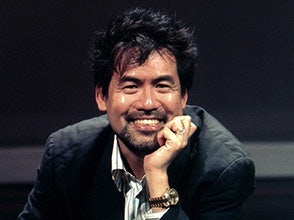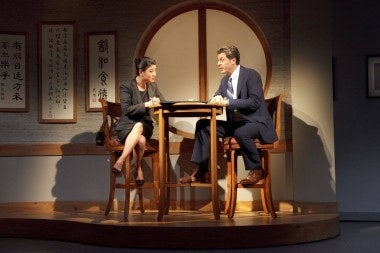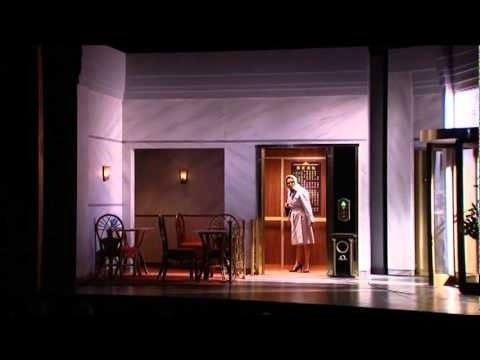Broadway's First Play Performed In Both Mandarin And English#

Last night, Jing Daily attended a conversation with Tony award-winning playwright David Henry Hwang at New York's China Institute, during which Hwang discussed his new play "Chinglish" along with director Leigh Silverman and the China Institute's Agnes Hsu. Debuted this summer at Chicago's Goodman Theatre, and currently running on Broadway, "Chinglish" tells the story of a businessman from Middle America attempting to close a deal in China, despite having never visited the country and speaking no Chinese. But beyond the comedic aspects of the businessman's disorienting experience in China and struggle to adapt to and navigate a business culture wholly unlike his own, "Chinglish" is, at its essence, about language and communication.
Early on at last night's event, Hwang and Silverman were quick to point out that language itself "is a character in the show," and as Broadway's first-ever play performed both in English and Mandarin (with projected supertitles), "Chinglish" throws audience members right into the bewildering world of miscommunication across cultures. Everything from the set design to supertitles has been painstakingly created to approximate the dizzying atmosphere of China experienced by the protagonist throughout the play. In their discussion at the China Institute, both David Henry Hwang and Leigh Silverman remarked that they themselves were swept up in the same confusing momentum on research trips to China during play's development.
When asked why "Chinglish" is set primarily in Guiyang, capital city of southeast China's Guizhou province, Hwang said he felt it worked best to pair a protagonist from a second-tier American city (in this case, Cleveland) with characters and a setting in a second-tier Chinese city -- bringing the protagonist in contact with a city in transition. As the city itself and the characters coming together there are all experiencing change and (in a way) culture shock, Guiyang lends itself to the storyline. As Silverman added, setting "Chinglish" in a rapidly changing second-tier city also works as the play delves into the idea of what modernization and "progress" means and what is sacrificed to achieve it. In addition to being inspired by often strained communication with translators on previous trips to China, Hwang and Silverman both added that the characters in "Chinglish" are essentially composites of the many people they came into contact with in Guiyang, Shanghai and Beijing.
Asked about the challenges of casting a bilingual cast, Hwang said the most difficult role to cast was the Chinese-speaking British "consultant" Peter Timms (played by Stephen Pucci), detailing an exhaustive search that covered four continents. While it's becoming increasingly easy to find Mandarin-speaking Westerners, and there is no shortage of Western actors currently working on television shows or in films in China (generally as "evil businesspeople" or "evil soldiers," he added to laughter among attendees), Hwang said Pucci has a rare balance of real acting abilities and excellent language skills.

Discussing reactions to "Chinglish," both Hwang and Silverman noted that reactions differed based on audience breakdown. Hwang pointed out that the reaction from Asian-Americans to "Chinglish" differs greatly from their reaction to his plays 20 years ago. While at that time Asian-Americans still outwardly displayed little connection to their root cultures, Hwang said, today they are more comfortable with the concept of connection to root culture. As such, the play is hitting the Asian-American zeitgeist at an interesting moment. Among younger audience members, or those who are second- or third-generation Asian-Americans or those adopted from China at a young age, reaction has been positive as they have expressed a thrill at seeing characters on stage traversing two cultures. As Leigh Silverman joked, part of the positive reaction also stems from the fact that "Chinglish" is possibly the first Broadway play that is "not a sob story about being Asian."
Among Chinese nationals studying or working in the US, reaction to the play differs based on their background, but the producers of "Chinglish" noted that large groups of Chinese students have attended showings of "Chinglish," many of whom have never before seen a Broadway play. Reaction among this group has been positive, the producers said, adding that Chinese media like China Daily and Xinhua have also responded favorably.
So what are Hwang and Silverman's plans for "Chinglish" going forward? When asked if the play will ever make it to China, both said they would love to show it in the mainland. Since they're unsure if it could ever get government clearance there, though, the primary focus will remain on touring North America first and then possibly major cities in Asia. If "Chinglish" does make it to China, the most likely destination will be Hong Kong. However, Hwang, Silverman and the play's producers all expressed an interest in eventually turning "Chinglish" into a movie, which -- whether through theaters or the black market -- could reach far more viewers in mainland China than physical performances ever could. As Hwang joked, the 1993 movie version of his 1988 play "M. Butterfly" mostly became popular in China precisely because it was banned in theaters.
"Chinglish" is now showing at New York's Longacre Theatre. Tickets can be purchased by phone at 212-239-6200 or online through Telecharge.#
Longacre Theatre#
220 West 48th Street
New York, NY 10036
Map
Official Website
Special thanks to Agnes Hsu of the China Institute, David Henry Hwang and Leigh Silverman.
